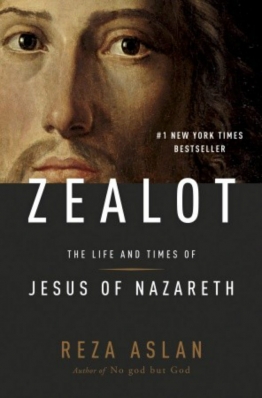Jesus, the Deconstructionist
Book Review of Zealot: The Life and Times of Jesus of Nazareth

Reza Aslan’s basic thesis in Zealot: The Life and Times of Jesus of Nazareth is that Jesus was a failed revolutionary who was willing to use violence to overthrow the political and religious order to bring in God’s kingdom.
He rejects outright the many teachings of Jesus about nonviolence, peacemaking, and love of enemies and dismisses as irrelevant Jesus’ refusal to resist his own capture and execution.
Instead, he focuses on a few passages where Jesus says he didn’t come to bring peace, like:
“I came to bring fire to the earth, and how I wish it were already kindled! . . . Do you think that I have come to bring peace to the earth? No, I tell you, but rather division! From now on five in one household will be divided, three against two and two against three . . .” (Luke 12:49-53).
Aslan’s argument can be easily refuted by historical scholarship, but we are still left to wrestle with Jesus’ teaching in the above passage. What is Jesus talking about?
Jesus is saying that reconstruction involves deconstruction. For God’s kingdom to come, our kingdoms have to go. God’s kind of peace is at first disruptive and divisive. Before Jesus can mediate God’s peace, he must overturn and disturb our false and shallow notions and expressions of peace.
Jesus disrupts our systems of meritocracy when he makes true religion a matter of the heart expressed through love of God and neighbor. Jesus disturbs our sense of self-righteousness, of what is pleasing and displeasing to God.
In the first church I pastored out of seminary, a deacon charged me with not preaching enough on sin. I told him I would. So I started talking about greed and our love of possessions, our self-righteousness and the arrogance of thinking that we alone have the truth and alone are right. I talked about the sin of judging others and trying to control others. I found out rather quickly that these were not the kind of sins he wanted me to preach against.
Jesus overturns our nationalistic and exclusive views of God, upsetting and challenging all tribal and national gods. Instead of carrying the banner “God bless Israel,” Jesus says, “God bless the whole, crazy messed up world” (see Luke 4:16-30). Jesus redefines who’s “in” and who’s “out.”
Jesus shakes up our materialistic view of worth and our sense of what constitutes success. Jesus speaks of the dangers of affluence, not the benefits. He redefines a person’s worth independent of position, power, or possessions and talks about how difficult it is for a rich person to enter the kingdom of God. Jesus says that in God’s kingdom the first will be last and the last first.
Jesus disturbs the nice little ways we package our faith. Many of us look to our faith to add another layer of security to our already secure lives. But Jesus calls us to a kind of commitment that thrusts us into dangerous and risky situations.
Jesus knows that our allegiance to his cause—to his vision of nonviolence, forgiveness, and social justice—and to his faith in a large, compassionate God who champions the plight of the poor and marginalized will be divisive, even within our own families.
Jesus calls for honesty, integrity, and humility in all our relationships and that can be inwardly disturbing. We like to steer away from our failures, but the Spirit targets them. Not because God wants us to wallow in feelings of guilt or condemnation, but because any true relationship with God and others must be grounded in truth and coupled with honest, humble confession.
Are we willing to allow Jesus to disrupt, disturb, and divide in order that we might embrace and embody a holistic vision of life?
Chuck Queen is a minister who blogs at http://www.afreshperspective-chuck.blogspot.com.
